Tomáš Verner looks towards a "real" life
August 23, 2014
By Magdalena Osborne
Photos © EMJO, Mireille Geurts, Joy, Emilie Korsakova, Caroline Paré
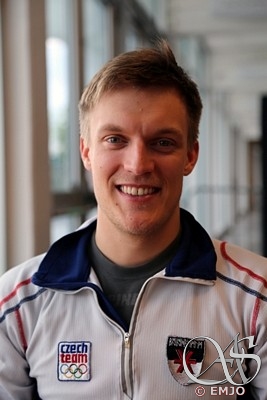 He started skating when he was 5 years old, and at age 28 he knows the sport inside and out. He has trained in his native Czech Republic, in Canada and Germany. He has experienced the old 6.0 and the current judging system and is not afraid to voice his opinion. As for most athletes his career has been like a rollercoaster. The ups meant good health, progress and medals. The down side was, as he calls them, his "2 years of misery", including injuries and self-doubt. It's always an adventure talking to Tomáš Verner.
He started skating when he was 5 years old, and at age 28 he knows the sport inside and out. He has trained in his native Czech Republic, in Canada and Germany. He has experienced the old 6.0 and the current judging system and is not afraid to voice his opinion. As for most athletes his career has been like a rollercoaster. The ups meant good health, progress and medals. The down side was, as he calls them, his "2 years of misery", including injuries and self-doubt. It's always an adventure talking to Tomáš Verner.
To skate or not to skate
He had a pretty good last season, starting off by winning the Ondrej Nepela Trophy in Bratislava, Slovakia. He then moved on to the Cup of Nice in France, which he also won, along with the Czech Nationals. In January of 2014 he placed 7th overall at the European Championships, but was third after his short program. At the Olympic Games in Sochi he placed 11th and finished 10th at the World Championships. The thought of making this his last competitive season had been brewing for a while and it was time to make it happen.
"I've quit competing now and I do it with a light heart because I've spend so many years on the ice trying to reach my goals. I'm not in my best shape right now, but when I finished last season I was in the greatest shape of my life. Still no medal. I've competed in 12 World Championships and never medaled. If I compete a 13th time, would it be any luckier?"
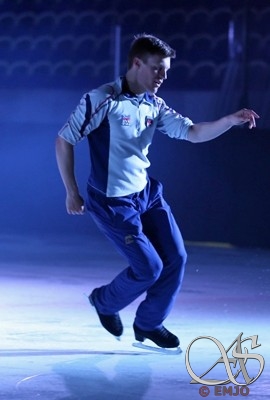 That we'll never know. But there is more to it than a missing Worlds medal. All the years of hard training and competing has taken its toll on his body. He has back pains, problems with his hips and he feels it would be irresponsible to himself and his body to push through another competitive season.
That we'll never know. But there is more to it than a missing Worlds medal. All the years of hard training and competing has taken its toll on his body. He has back pains, problems with his hips and he feels it would be irresponsible to himself and his body to push through another competitive season.
"I cherish my health and being a 28 year grown-up man - well, almost grown-up, I'm not quite there yet - I want to start building a real life. Figure skating is almost a real life, but spread out. You go through all the phases of life but in a shorter time span. In 22 years I've been through birth and death on the ice and everything in-between. But this is how it is and I need to build something of my own now. I may still be very involved in skating, or maybe not, I haven't decided yet. But I have lots to do, like hopefully this year I can finish my studies in sports marketing and management at the University of Prague."
While he's deciding he wants to stay in touch with the sport, but not necessarily spend every day on the ice.
"I have to figure out a way to keep my mind busy, because doing only one thing is killing me, whether it's school or skating. Maybe I'll get into a suit and tie and be a business man supporting the sport!"
That would be one way. Making the transfer easy and do some shows is another. During the summer Tomáš has performed in Yuzuru Hanyu's Together on Ice and another exhibit in Japan. He's also taught some classes at the Ice Dome summer camp in Oberstdorf, Germany, where he's had his training base for most of his career. And this fall he'll narrate a Russian fairytale in the Czech Republic and then tour with Evgeny Plushenko and Brian Joubert, among others.
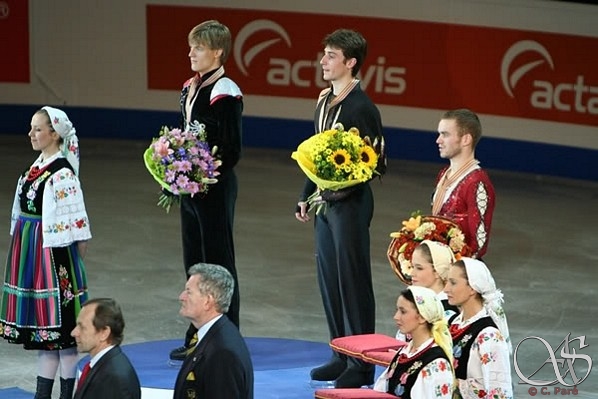
European Championships 2007
Two years of misery
Having been a competitive skater for so many years he's had his share of the good and the bad.
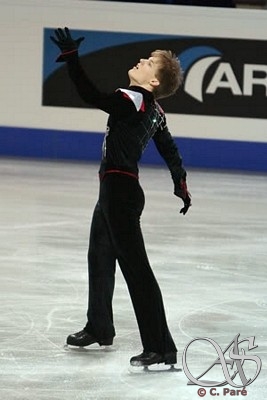 In the 2006/2007 season he won the Nebelhorn Trophy in Germany, had a pretty good Grand Prix season and earned silver at the European Championships. He was 4th at Worlds. The following season he won Europeans and was ready to win Worlds.
In the 2006/2007 season he won the Nebelhorn Trophy in Germany, had a pretty good Grand Prix season and earned silver at the European Championships. He was 4th at Worlds. The following season he won Europeans and was ready to win Worlds.
"I was right there but then I screwed up. In 2008/2009 I medaled in my Grand Prix events, but I was only 6th at Europeans and 4th (again) at Worlds because I messed up, and this was a cycle I couldn't get out of, but repeated and repeated. I came out of a good spot in 2008 going into 2009. Same spot as before. I put a lot of effort into practices and so did everyone else on the team, but it just wasn't working."
He decided to give it one more season. It started out great with silver at the Trophy Eric Bompard, but turned out to be a bad year. Tomáš got seriously ill and had some problems with the anti-doping committee; there was a misunderstanding about his whereabouts. It took two months and a lawyer to convince the committee it was their fault.
 "It was a miserable time of my life. I wasn't in good health or good shape, but I competed in the Vancouver Olympics anyway and it was a terrible experience (he finished 19th). Something had to change. I was desperate; I was stuck in one place and I told Mr. Huth I had to leave. It was nothing personal, it never was, but I had to go somewhere else."
"It was a miserable time of my life. I wasn't in good health or good shape, but I competed in the Vancouver Olympics anyway and it was a terrible experience (he finished 19th). Something had to change. I was desperate; I was stuck in one place and I told Mr. Huth I had to leave. It was nothing personal, it never was, but I had to go somewhere else."
So he left Oberstdorf and moved all the way to Toronto, Canada. There he joined coach Bob Emerson and his team.
" Working with Bob was a great experience and it showed me that I had a lot of potential. I jumped back into the Grand Prix, medaled at both events and made the final. I got bronze at Europeans. However, after the first successful season I injured my back during summer preparations and ever since that injury I wasn't able to gain back the same shape as previous years. My physical condition strongly influenced my mental condition and my self confidence."
More injuries followed and it was a tough time and time to make another tough decision.
"After three seasons in Canada I returned to Oberstdorf where I had a good training environment with everything I needed. I asked Mr. Huth if he would take me back and he did. And I had a successful season. Of course it could have been more successful, but it was good. I walked away from 2 years of misery with my head held high."
What would keep someone going through all that misery? Most people probably would have called it quits, but Tomáš didn't. He might have felt like quitting, but he never did.
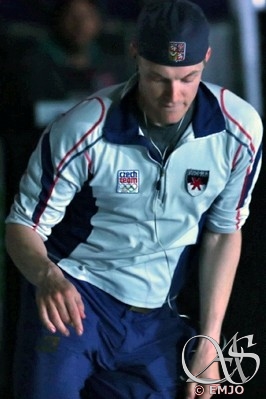 "No, I never quit. I never walked out of a competition either, except once in China when I had a broken ankle, so it was a bit hard to finish the free skate. I never quit simply because I love the sport, I have this passion… It's hard to describe to anyone who hasn't been on the ice."
"No, I never quit. I never walked out of a competition either, except once in China when I had a broken ankle, so it was a bit hard to finish the free skate. I never quit simply because I love the sport, I have this passion… It's hard to describe to anyone who hasn't been on the ice."
He smiles and adds: "But I guess the Absolute Skating readers know what skating is about, how once they step on the ice they can move around and feel the freedom - it's a special gift."
Tomáš is well aware of Absolute Skating and what we do. His official website is an affiliate and managed by Absolute Skating crew members, and he's met with many of us before. Visit his website here.
And extra you can find a trainingsvideo of the beginning of the past season (September 2013) here.
The awareness of the gift he mentioned is something he tries to pass on to young skaters.
"When I teach seminars I tell the kids it's a great privilege to be in this sport. They should feel privileged because not everyone has the opportunity to do it, afford it, or do it well. I tell them: ‘but you're already here, so don't worry. Listen to your coach and do what they say and enjoy and everything will be good.' And that, by the way, was my own problem most of the time; I worried too much!"
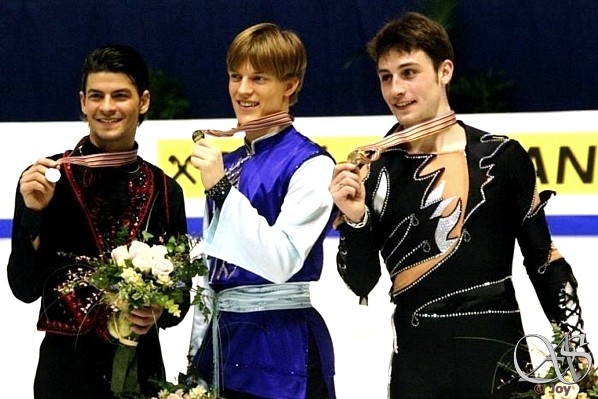
European Championships 2008
The good, the bad and the ugly
Tomáš is a very funny guy and a chatterbox. There are no diva manners and he likes to laugh and joke. Somehow those characteristics are reflected in his programs; he can radiate joy like few others.
"I like light and funny music with the idea for a joke within the music. But I understood I couldn't do it every year in every short program, and I also liked the change from serious to fun. But if I have to name my favorite programs it would be the short swing program from 2007/2008, I did it with Lori Nichol. And then the Dueling banjos short program from this past season. Those were the most fun programs I've ever done and this is my preference, although as a skater you must be creative and bring new ideas, new things on the ice to keep the judges interested."
We're now heading into the topic of judging, and he has plenty to say about it.
"Sometimes I think the judges don't even watch us and what we do, they have some sort of preset mind and they already know what we will present in a program, even though they have no idea what's coming. Sometimes the judges have their own minds."
Most of us can probably plead guilty to having watched a performance and then totally disagreed with the points given by the judges. At some competitions the audience has even booed the score. Being a judge is probably no walk in the park, and few elite skaters seem to consider it as a future occupation. But maybe Tomáš could?
"No, NO! Maybe a technical specialist – maybe. I don't know how long the procedure of becoming one takes, cause if I did it I would like to judge on an international level. There I could use my knowledge and maybe actually add a touch of sense and humanity. Among all the bad cases, there is a really good example: Alexei Urmanov. I talked to him about judging and being a technical specialist and he said for him the rule is clear; if there's a 50/50 chance to grant or not grant a level, they should always rule in favor of the skater because he/she tries. But he's the exception."
He thinks many technical specialists and judges make it easier for themselves by looking for the skaters' mistakes. It may be easier to mark a mistake and it's understandable in one way.
"But the skaters, we're not looking to make it easier for us! We try the harder elements and we try to be creative and the judges look for the easy way for themselves. They can put us down and leave room for the good ones."
That sounds like the old 6.0 system, where skaters were ranked, and that doesn't seem like progress.
"Well, I'm not the brain of the universe, but if you change the system but don't change the people, what really changes? Nothing, you can even make it worse. If the judges aren't going to appreciate skating skills then the new system has no value. It's actually worse because now they can put even more on the technical value with the plus/minus GOE system. This was quite easy to recognize with the old system. I mean (Alexei) Yagudin came on the ice, he did all the triples and a quad and he could receive 6.0. Done! If he was shaky on the flip, which he used to be: 5.9 and there was room for (Evgeny) Plushenko. It was very understandable for everyone: judges, coaches, skaters, audience… they all knew."
Few skaters would be willing to go back to the old system, but most, if not all of them, would welcome the return of open judging.
"We know there's a face behind those marks, but what do we see? We don't see anything but the different numbers; no face behind it. We (the skaters) show our faces and represent ourselves on the ice. They (the judges) are responsible too; they are grown up people and they should represent themselves as well. I don't see why they should be able to judge without identity. I'd remove that instantly if I could."
Another issue is how skaters from different nations are judged differently, say the Czech Republic versus Russia.
"Well, it's not general for the Russians, but judges do tend to lean towards the big nations. A small country has small leverage here. I don't want to call anyone a cheater, but it's hard for the Czech federation to make half of the judging panel lean towards their skater. Let's face it, if the Czech skating association ceased tomorrow, the ISU would just continue. But if there was no more Japanese figure skating association, then maybe there would be one more Olympics and then no more. How do you not get influenced by that as a skater? This is bigger than us skaters, it's bigger than what I can do on the ice."
He has some valid points there. And then there's the really ugly face of skating. The bigger the federations, the more lobbying, wheeling and dealing because there's more money and power involved. It's politics and unfortunately it's the same in sports everywhere. But with the current system the judges are supposed to have the tools to measure a performance exactly. However, that's not how it goes.
"I know how it is, I'm not stupid. I see how the system works and I understand it, and I can walk away. But I haven't, I've stayed here 23 years and I've loved being a skater. Do I feel I've been cheated on by the judges? No, because I'm not sitting in the audience watching myself. I feel what I do, but I can't see it. But do I feel upset by the judging of some of my friends? Yes, very much, because I'm sitting there and I see exactly what the judges see. And the marks they give, shame on them! What are they thinking?"
European Championships 2011
My favorite things
Tomáš will not compete this season, but he ended the last one on a high note.
"Yes, the last short program at the Worlds championships, where I was finally able to deliver it the way it was supposed to be, was great. And knowing that my choreographer (Lori Nichol) was there in the audience! My goal wasn't to make her cry but since Carolina (Kostner) makes her cry almost all the time she spends on the ice, I thought: ‘hey, you can shed a tear for me too, right?' And she did so it was good."
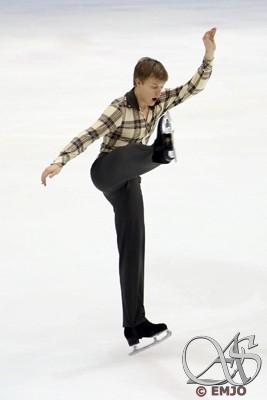 Just talking about it makes him moved.
Just talking about it makes him moved.
"When I finished the program I saw the reaction from the crowd; the standing ovation! I bowed to every side and enjoyed a few moments on the ice. Then I returned to the little door to exit the ice and I saw the faces of my two coaches who have been with me for so long (Vlasta Kopřivová and Michael Huth), that's indescribable, you can't get enough of it! I wanted to stop time and tell everyone: ‘don't go or you'll spoil the moment!' And I went to them and yes, they were very happy. Mr. Huth always tries to be calm but he couldn't be calm then. And Vlasta was standing up after the program and there was pure joy. There were some really strong emotions that moment, positive ones. It was probably my strongest experience in skating."
And the opposite of the years of misery he'd experienced earlier; it was a moment he will keep forever in his memory.
"I will, after all life is what we make it. If I wanted this to be my only memory from skating then it would be. Done. We would need to say no more, and certainly not talk about my 2 years of misery. But there have been some ups and downs, even in the misery. I remember skating a Grand Prix event in Japan. I was pulling down my suspenders and boom, I smashed my face on the ice right in front of everybody when they were just getting excited over the step-sequence. This is actually one of my favorite moments, but maybe not as strong as the one at Worlds. But this is how it is on the ice, you get too excited and, wham, it brings you right back down to earth! And in front of my crowd in Japan! I didn't do well there but I enjoyed being on the ice. And I laughed at myself because there was nothing I could do to cover up or hide what had happened. So those were my good memories. It doesn't have to be winning competitions, but emotional moments in skating."
After so many years of performing he'll be able to look back at a lot of things and laugh, although they weren't laughable when they happened.
"Absolutely, I agree. But I'm not going to live the past, now I only look to the future. We'll see what I can do tomorrow and take it from there."
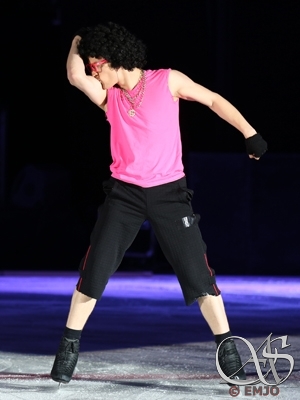
A good attitude for someone who's already lived a whole (skating) life, but is still young enough to have another life ahead. Our chat is over and it's time to take a picture for the article. The clown returns, like he just can't resist the opportunity:
"How's my hair?"
He's frantically smoothing it pretending to be very vain. This is Tomáš Verner in a nutshell and hopefully that will never change.



